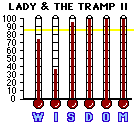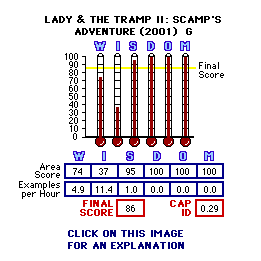Click on CAPCon Alert
image for explanation
A service to parents and grandparents
MAR21023
Lady and the Tramp II: Scamp's Adventure (2001), (G)
CAP Score: 86
CAP Influence Density: 0.29

Click on CAPCon Alert image for explanation |
A service to parents and grandparents MAR21023 Lady and the Tramp II: Scamp's Adventure (2001), (G) CAP Score: 86 CAP Influence Density: 0.29 |
 |

 Switch to LifeLine for Christian long distance service   Comments?  Christian Media News   A Singles Christian Network  Your One Stop  For Everything Christian Free Email Ministry  Subscribe Today!!  |
 Christian Banner eXchange For FREE text-only versions of our media analysis reports as they are calculated, open this email then click "send." If your browser does not handle this URL format properly, send us a request to add you. NOTE: If you do not want the plot, ending, or "secrets" of a movie spoiled for you, skip the Summary/Commentary. In any case, be sure to visit the Findings/Scoring section -- it is purely objective and is the heart of the CAP Entertainment Media Analysis Model applied to this movie  SUMMARY / COMMENTARY:
LADY AND THE TRAMP II: SCAMP'S ADVENTURE (G) -- ...it also possesses "new age" properties... Before getting into our analysis of *Lady and the Tramp: Scamp's Adventure*, let me revisit some background about the CAP Entertainment Media Analysis Model. Though the CAP model was developed by observation of human behaviors does not mean it cannot be applied to animated behaviors. If you are not interested in or are already familiar enough with the rationale behind the CAP model applied to animated entertainment, skip to "Enough of the behavioral science" -- to the third paragraph below. Our analysis model assumes that any cartoon behavior which can reasonably be duplicated by a human child has equal potential as the behavior of any live actor/actress to produce copycat behavior or to catalyze or embolden other behavioral influences. I have not yet determined how much of a contribution the age or social stratum of the performing character, live or animated, has on copycat/catalytic influence. Adult-aged performers (live or animated) may be viewed by younger children as authority figures to be emulated. Performers of the same age/social stratum as the observer could induce sympathetic behavior by camaraderie. The behavior of performers of the same age or same social stratum as the observer is assumed to be the most influential. From providing nine years of 24-7 care for 24 kids ranging from 2 weeks old to 17 years old, I have observed for as young as toddler that mimicking of animated behaviors to be as likely as mimicking of live actor/actress behaviors: that the mimicking is manifest not so much as destructive/aggressive physical behaviors until teen years (post pubescent), but is most likely to be manifest as arrogance and rebellion, particularly verbal, and to a lesser degree passive aggressive defiance. In other words, it appears to be as likely for younger children that, for example, the mouthing off to parents in a cartoon might as easily produce verbally rebellious and arrogant behavior as might be produced by the mouthing off to parents by live actors/actresses of the same age or social stratum. It further seems that older children (post pubescent) are more ready than younger kids, even openly willing, to incorporate the suggestions of aberrant behavior in entertainment, live or animated, particularly the aggressive and defiant behavior suggestions: those which seem to promise superiority and gratification through freedom from accountability, freedom from authority and freedom from consequences. Enough of the behavioral science. Suffice it to say that same-age/stratum aberrant behaviors in animated entertainment or in live actor/actress performances likely possess equal potential of causing the displayed behavior in children -- good or bad. While *Lady and the Tramp II: Scamp's Adventure* is a bright romp in the style of child-oriented Disney productions, it also possesses "new age" properties. By comparison of the volume of impudence in it, the 84 score of *Lady and the Trmp II* made it numerically equivalent to the scores earned by PG movies. A lite PG -- only three of 18 points under the bottom of the scoring range for G-rated movies (100 to 87) -- but a PG nonetheless. And while the magnitude of each individual issue of impudence were not nearly as acidic as most of them in R-rated flicks, the sheer volume of them earned a score equivalent to the scores of some R-rated flicks. I didn't write the movie, folks. I just report on what is there and the computer generates the scores just like it has for more than five years. Remember "R-13?" Well, maybe we are witnessing the birth of "GPG." *Lady and the Tramp II: Scamp's Adventure* presents much the same storyline as the original 1955 *Lady and the Tramp* but with a magnification of the "Go ahead and do the wrong, as long as you are sorry for it afterwards" rationale. As if the few moments of "redeeming programming" in the end excuse the long display of rebellion and defiance. The prodigal Scamp (the voice of Scott Wolf), son of Tramp and Lady struts his inherited bravado, mostly against his father's parental authority: "I gotta be wild and free like a dog is supposed to be!" All attempts at disciplining Scamp seem so futile and even seem to fuel Scamp's fire [Prov. 1:7; Isa. 30:1]. Once Scamp gains his "freedom" he roams the neighborhood and encounters some junkyard dogs. Convinced of the joy of being a junkyard dog which can jump on any couch in the yard, knock over any lamp, or chew any hat or shoe, Scamp performs a number of initiation rites for the junkyard dog leader, Butch (the voice of Chazz Palminter) to prove he is worthy of acceptance into the prestigious packhood of Junkyard Dog, free of all rules (except mob rule). Of course the initiation rites included stealing and risking personal safety and the safety of others. And Scamp willingly submits to such to further his efforts to be free of rules as a junkyard dog, to be cool. Amidst the fray is Angel (the voice of Alyssa Milano) who may be the only non-family solidity for Scamp. Angel, being the only "girl" in the junkyard gang is Butch's girl -- or so he says. To which her reply is I'm NOT your girl." Angel is not so sure the gang is the right place for Scamp and proceeds to convince him of this. Finally she does and becomes Scamp's "girl." And in the end all is well. Life resumes with the prodigal Scamp returning home to his family and taking Angel with him. And without consequences for the stealing or other aberrant behaviors. It would be nice if the real world were like that. Or would it? Maybe criminals could just say they are sorry for defying the rules and be forgiven with no consequences? I know it is a stretch between criminal and simple stealing .......? Hmmm. I remember a news article which reported of a five year old who took a gun to school in his backpack because he saw it on TV and thought it was cool. Regarding Scamp returning home like the prodigal son, the Bible speaks to what parent would give a stone to a child who asks for bread [Luke 11:11]? It also tells of the unconditional love of the parent of the prodigal son [Luke 15:11-24]. But the Bible further tells us to drive rebellion far from our children [Prov. 22:15]. Indeed, oft times our love for our children *must* manifest as discipline [Prov. 13:24]. Be careful not to equate the reasons the prodigal son left home with rebellion and arrogance. The [adult] lad decided it was time to strike out out his own but made some poor choices and needed help. The point being that while we must love our children unconditionally, we must at times use tough love to show it. A parent must not let his/her child threaten or coerce as did Scamp but a parent is to never stop loving the child, no matter what s/he does. On more than one occasion the story also tries to use the sins of the parent to excuse the sins of the child, e.g., "You did when you were young. Then so am I!" In no case do your sins excuse mine, nor mine yours. And neither must a parent let his/her son/daughter sin just because the parent did. Further, the story taught of disregarding of the rules: that rules are only there to make youth controlled and unhappy. By the way, Angel and Scamp meet the same jolly restauranteer Lady and Tramp met in 1955 and get the same spaghetti and meat ball speciale and the same romantic interlude. But the humility of Lady in the 1955 *Tramp* when her "lips" met with Tramp's when slurping the same strand of spaghetti was not there when Angel and Scamp's "lips" met... Remember folks. I just tell you what is there and give you some comparative tools to help YOU decide whether a flick is fit for you and/or your family. If needed to focus or fortify, applicable text is underlined or bracketed [ ]. [NOTE: The rod *figuratively* means a bar or pole as the rod in the hands of a shepherd who never uses it to cause damage to his sheep but to guide and correct AND save them. "Rod" also means a mark of authority. See *Spare the Rod - Spoil the Child: A Parental Perspective *******Food for Thought******* As always, it is best to refer to the Findings/Scoring section -- the heart of the CAP analysis model -- for the most complete assessment possible of this movie. FINDINGS / SCORING: 
NOTE: Multiple occurrences of each item described below may be likely, definitely when plural. Wanton Violence/Crime (W): Impudence/Hate (I)(1): Sex/Homosexuality (S): Drugs/Alcohol (D): Offense to God (O)(2): Murder/Suicide (M)(3):
 |